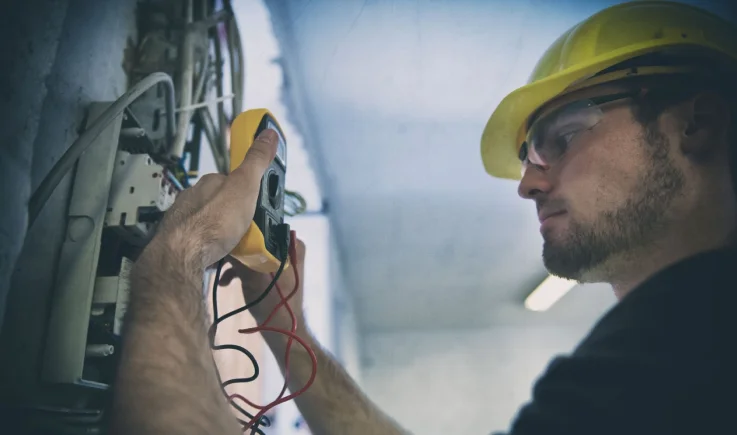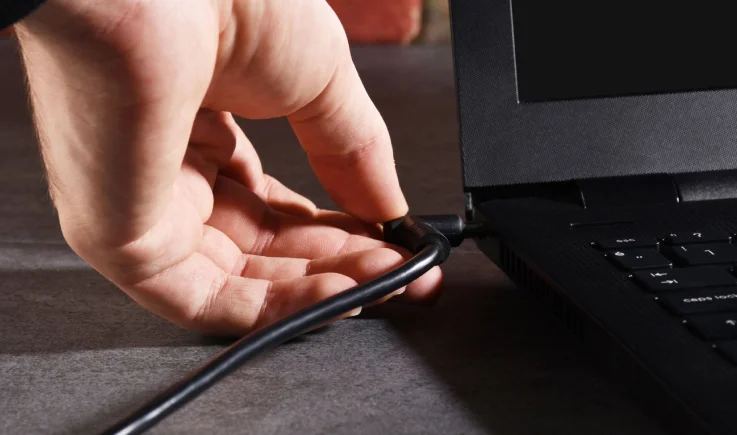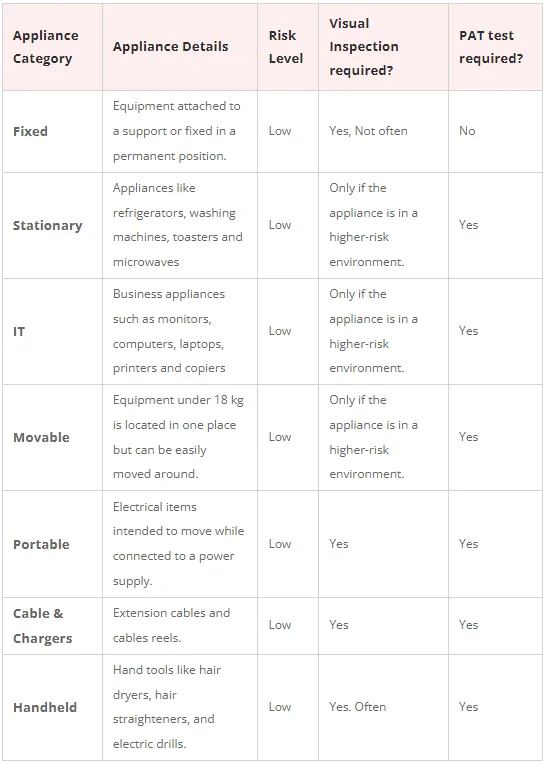🕑 7 minutes read

Have you ever wondered what PAT testing is and whether it's a legal requirement in your industry? Hopefully, we have the answers to your questions in this article. We will guide you to understand its purpose and discover it is a necessity for businesses within certain industries.
The PAT inspection includes checks for insulation resistance, lead polarity, and earth continuity.
What is the PAT test?
For any portable appliance to be deemed safe when working on-site or used in a rented property, it must pass a rigorous test known as a Portable Appliance Test (PAT). A PAT test is a detailed examination to assess the home or business's safety to prevent electrical accidents.The PAT inspection includes checks for insulation resistance, lead polarity, and earth continuity.
Every appliance shall be labelled "passed" or "failed" upon completion of a PAT test and the outcomes documented.

At serviceteam, our PAT inspection test covers all portable mains-powered devices, such as refrigerators, electric cookers, kettles and toasters. In addition to the thorough examination offered by a Pat Testing service, we also provide Electrical Installation Condition Report (EICR), which will check for any faults in the static wiring circuitry, switches sockets or light fittings within the property.
This makes the term "portable" a little misleading, i.e., a fridge freezer or electric hob is hardly portable, but both can be unplugged and used in a different location.
At least seven categories of appliances should be taken into account for a thorough PAT test, or at least a visual inspection:
Simply put, the law compels employers to make sure that all electrical equipment is maintained properly to reduce any risks. It doesn't specify how frequently the tests should take place, but in a rented/tenanted dwelling, it should be completed each time the tenancy changes.

Safety always matters! That's why PAT testing is a widely accepted process to ensure safety, particularly in large or high-risk scenarios such as construction sites etc.
'Electrical class' of the appliance in PAT testing/inspection.
Different categories of electrical appliances pose varying levels of risk. In order to minimise the risks, it requires different measures for safety.
Class 1:
Most hazardous, requiring a full PAT test to ensure safe usage. These appliances have standard insulators and rely on earth for protection.

Class 2:
These devices have an additional insulation layer, do not rely on earth for protection, and are safe.

Class 3:
No testing requirements at all. Appliances are the safest class of electrical equipment because they are low-voltage devices. They might need to have their charging leads PAT tested.

‘Classes’ of the electrical appliance in PAT testing/inspection.
 ‘Category’ of the appliance in PAT testing.
‘Category’ of the appliance in PAT testing.

PAT testing frequency is determined by three primary factors:
Environment: Any appliance used on a building or construction site must be tested more frequently than those used in an office environment as they are more prone to damage.

Users: How safety conscious is the equipment's users? Are they capable of reporting problems or not? If not, maybe, this is a reason to introduce a test frequency.
Equipment Construction: When choosing the PAT inspection frequency, it is important to take into account the structural integrity of the appliance or its Class (Class I or Class II).
Equipment Type: Handheld equipment may require more regular testing because it is more prone to damage than fixed equipment.
Frequency of Use: Equipment used frequently will experience more wear and tear during its lifetime. This increases the likelihood of damage, which suggests more frequent testing.
Installation: The installation method should be considered when determining the PAT testing frequency, especially with fixed equipment.
Previous Records: Analysing previous test results can give insight into how frequently the appliance has been tested and its maintenance history. This may help when considering the test frequency.
Functional In-service Life: Some IT appliances/equipment may have a purposefully short service life and may require more frequent testing and/or replacement.
At servicetam in London, our friendly team and experienced engineers are ready to discuss the importance of portable appliance testing in order to minimise the risk.
Need to ensure that your property is safe and in accordance with government regulations? Our gas-safe accredited engineers are ready, day or night, in London. From PAT testing through Annual Boiler Service, from Electrical Inspection Condition Report (EICR) to Gas Safety Certificate (CP12), we have you covered across London 24/7.
Get in touch today or book an engineer online!
PAT (Portable Appliance Test)
The current legislation does not define "portable appliances"; however, the accepted definition is "any device that has a plug attached to it and plugs into a power outlet."This makes the term "portable" a little misleading, i.e., a fridge freezer or electric hob is hardly portable, but both can be unplugged and used in a different location.
At least seven categories of appliances should be taken into account for a thorough PAT test, or at least a visual inspection:
Fixed appliances
Stationary appliances
IT appliances
Moveable appliances
Portable appliances
Cables and chargers
Hand Held appliances, i.e., hair dryers, curling tongs etc.
According to present UK legislation, companies must keep their electrical equipment safe. In addition, they are legally obligated to guarantee both employee and general public safety.Simply put, the law compels employers to make sure that all electrical equipment is maintained properly to reduce any risks. It doesn't specify how frequently the tests should take place, but in a rented/tenanted dwelling, it should be completed each time the tenancy changes.

Safety always matters! That's why PAT testing is a widely accepted process to ensure safety, particularly in large or high-risk scenarios such as construction sites etc.
What are the consequences if I don't adhere to the law?
The punishment for breaking the law regarding electrical appliance safety can include imprisonment and or an unlimited financial penalty in the event of serious injury or death.'Electrical class' of the appliance in PAT testing/inspection.
Different categories of electrical appliances pose varying levels of risk. In order to minimise the risks, it requires different measures for safety.
Class 1:
Most hazardous, requiring a full PAT test to ensure safe usage. These appliances have standard insulators and rely on earth for protection.

Class 2:
These devices have an additional insulation layer, do not rely on earth for protection, and are safe.

Class 3:
No testing requirements at all. Appliances are the safest class of electrical equipment because they are low-voltage devices. They might need to have their charging leads PAT tested.

‘Classes’ of the electrical appliance in PAT testing/inspection.


When should PAT tests be performed?
Electrical safety can be taken to a different level with the correct precautions. According to law, PAT tests do not need a specific frequency, but any risk should be managed to ensure everyone's protection.PAT testing frequency is determined by three primary factors:
The danger level of the workplace.
The electrical class of the appliance.
The appliance category.
When determining how frequently appliances need to be PAT tested, individuals are instructed by the 5th Edition Code of Practice to consider the following eight risk factors:Environment: Any appliance used on a building or construction site must be tested more frequently than those used in an office environment as they are more prone to damage.

Users: How safety conscious is the equipment's users? Are they capable of reporting problems or not? If not, maybe, this is a reason to introduce a test frequency.
Equipment Construction: When choosing the PAT inspection frequency, it is important to take into account the structural integrity of the appliance or its Class (Class I or Class II).
Equipment Type: Handheld equipment may require more regular testing because it is more prone to damage than fixed equipment.
Frequency of Use: Equipment used frequently will experience more wear and tear during its lifetime. This increases the likelihood of damage, which suggests more frequent testing.
Installation: The installation method should be considered when determining the PAT testing frequency, especially with fixed equipment.
Previous Records: Analysing previous test results can give insight into how frequently the appliance has been tested and its maintenance history. This may help when considering the test frequency.
Functional In-service Life: Some IT appliances/equipment may have a purposefully short service life and may require more frequent testing and/or replacement.
At servicetam in London, our friendly team and experienced engineers are ready to discuss the importance of portable appliance testing in order to minimise the risk.
Need to ensure that your property is safe and in accordance with government regulations? Our gas-safe accredited engineers are ready, day or night, in London. From PAT testing through Annual Boiler Service, from Electrical Inspection Condition Report (EICR) to Gas Safety Certificate (CP12), we have you covered across London 24/7.
Get in touch today or book an engineer online!






